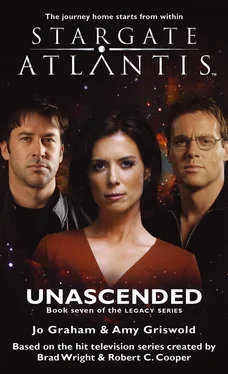“Or something,” John said. Ferrying pieces of machinery back and forth sounded like a prime job for someone else.
He ended off passing the job on to Lorne, who didn’t look thrilled but duly promised to round up a team to go disassemble the thing. “You’re sure this thing is safe?” he asked on his way out.
“McKay says don’t press any buttons.”
“We know not to press buttons,” Lorne said, not sounding comforted.
John shrugged. “As safe as anything else. Watch out for the big ostrich guys with spears and nets. They seemed to think we’d be good with ketchup.”
“Will do,” Lorne said resignedly.
Woolsey regarded the team across the conference table the next morning, cradling the cup of coffee that was all that made dealing with enthusiastic scientists bearable before noon.
“We need to look for another Asgard installation,” Rodney said.
“You have a weather machine to play with,” John said.
“Climate control device. Or… actually, it might be something that could very roughly be described as a ‘weather machine,’ but it’s hard to tell when we’re missing anything like a set of instructions.”
“I thought it said ‘don’t press any buttons.’”
Rodney rolled his eyes at him. “Useful instructions. Or would you prefer that I start experimenting by pressing the buttons that say ‘don’t adjust settings if you don’t know what you’re doing?’”
“Not on the planet where we currently reside, please,” Woolsey said.
“Well, right now it’s a moot point, because when we tried to power it up—”
“I thought you said you weren’t going to experiment.”
“We were going to provide just enough power to get some information about its current settings,” Rodney said. “Believe me, despite the attractions of doing something about this planet’s wretched weather, we aren’t that stupid. My point is, when we powered it up, it burnt out half its systems. Maybe our equipment wasn’t compatible, maybe the thing was just old, I don’t know, but there’s no way to fix it without rebuilding large parts of it. Which is hard to do when we don’t know how it works.”
“You made us haul that thing home,” Ronon said.
“It’s still useful,” Rodney said. “Just not incredibly useful when all we have is one broken device. I think we should try to find another one.”
“I actually agree with Dr. McKay,” Daniel said, with an expression that made it clear he felt that was a possible sign of the apocalypse. “This is the first early Asgard settlement site — or maybe it’s better described as an observation post — that we’ve seen in the Pegasus Galaxy. Even though it’s not nearly as early as the Ancient sites we were originally looking for, I’m tempted to see if we can find out anything else about what the Pegasus Asgard were up to at this point. I realize it may not have immediate practical applications—”
“I agree with you both,” Woolsey said.
Rodney looked up in startlement as if he’d been busy preparing his next argument. “You do?”
He put down his coffee cup reluctantly. “How likely is it that the device you found is capable of having more than an extremely localized effect on climate conditions?”
Daniel and Rodney exchanged glances. “Reasonably likely,” Rodney said after a moment. “We know that after the Wraith pushed the Pegasus Asgard back to a single planet, they dealt with some fairly horrible atmospheric conditions. And, no, they couldn’t fix it, but whatever equipment they came up with while they were trying could have been based on devices like this. We’ve examined its power supply, and if it’s designed to do something on a local level, it’s sure not to heat somebody’s house.”
“We also know that the Asgard have some ability to intervene to prevent natural disasters,” Daniel said. “Mainly from situations where they told us that they wouldn’t help, but they did strongly imply that they could have.”
“Nice guys,” Ronon said.
Daniel shrugged. “They had a treaty with the Goa’uld that allowed them to interfere to help other species in certain situations but not other ones. It was a complicated situation. Maybe a little like the one we’ve ended up in with the Wraith.”
Teyla and Ronon both looked uncomfortable at that. Woolsey was aware that the treaty was still a point of contention between them. Teyla was far more optimistic about its consequences than Ronon was, and while Woolsey agreed with her on the whole, he could also see why Ronon was skeptical. Ronon’s personal experiences with the Wraith aside, their own previous attempts to work with the Wraith had produced decidedly mixed results.
“Moving on,” John said firmly. “Is this really a priority to follow up?”
“Colonel Sheppard, as you may be aware, living in Atlantis can lead to developing a somewhat skewed view of essential priorities,” Woolsey said. “From the point of view of the Atlantis expedition, power sources, weapons, and devices that will improve interstellar travel are fundamental needs. But in terms of solving problems for people back on Earth, a functioning device that would allow us to control weather and climate patterns would be even more important.”
“And dangerous,” Rodney said. “I have to point out that trying anything like that on Earth would also be extremely dangerous.”
John looked at him sideways. “You were the one who wanted to play with it.”
“I want to bring it back here to study, but let’s have realistic expectations.”
“Noted, Dr. McKay,” Woolsey said. “But in the realm of realistic expectations, I am fairly confident that the IOA will consider even a possible solution to Earth’s climate problems to be a significant find. And in my position it pays to produce at least occasional results that they actually like.”
“Understood,” Sheppard said.
“I’m glad to hear it. So, you have my official permission to look for more Asgard technology. Where do you propose to find it?”
Daniel and Rodney exchanged glances again, this time as if each of them were hoping the other had a brilliant solution already prepared. “I want to go through the records of previous offworld exploration by the Atlantis expedition to see if there’s any evidence that might point us in the direction of Asgard sites,” Daniel said.
“I think we would have noticed if there were Asgard bases on the planets we’ve been to,” Rodney said.
“Some have only been briefly explored,” Teyla said.
“Usually for good reason,” John pointed out.
She smiled and nodded a little, granting the point. “Even so, Dr. Jackson might discover something we missed. We have mainly been interested in contacting local inhabitants and looking for working Ancient devices, not in searching for extremely old settlement sites that may be buried beneath the ground.”
“I was also thinking we could ask our allies if they’ve seen any artifacts that might possibly be Asgard,” Daniel said. “Anything with their writing on it, or anything using some of the distinctive features of their architectural style. I can put together a simple briefing on what to look for.”
“Please do, Dr. Jackson,” Woolsey said. “We’re only in irregular contact with the Travelers and the allied Wraith faction, but we can certainly bring the subject up with the Athosians, the Satedans, and the Genii.”
“You might also ask them if they’ve seen Elizabeth,” Rodney said, without looking up from his coffee, as if that were a perfectly reasonable thing to say.
It was very quiet at the conference table for a moment. “We’ll check in with our allies,” Woolsey said finally. “Let’s revisit the Asgard question once we hear what they have to say.”
Читать дальше












